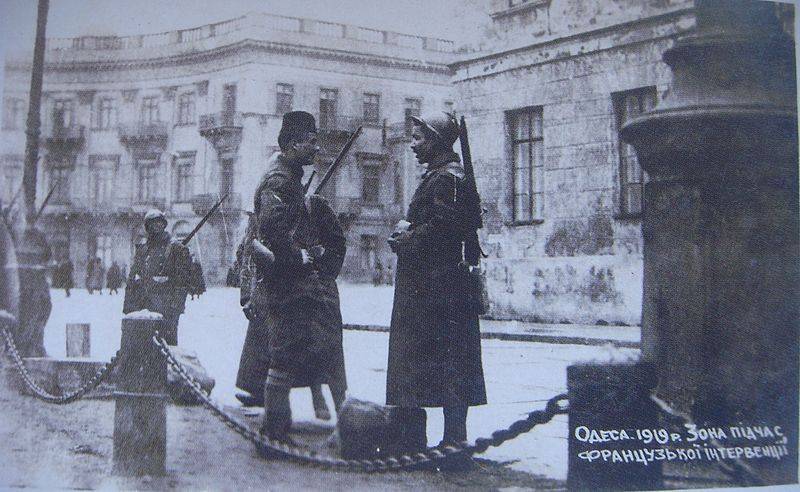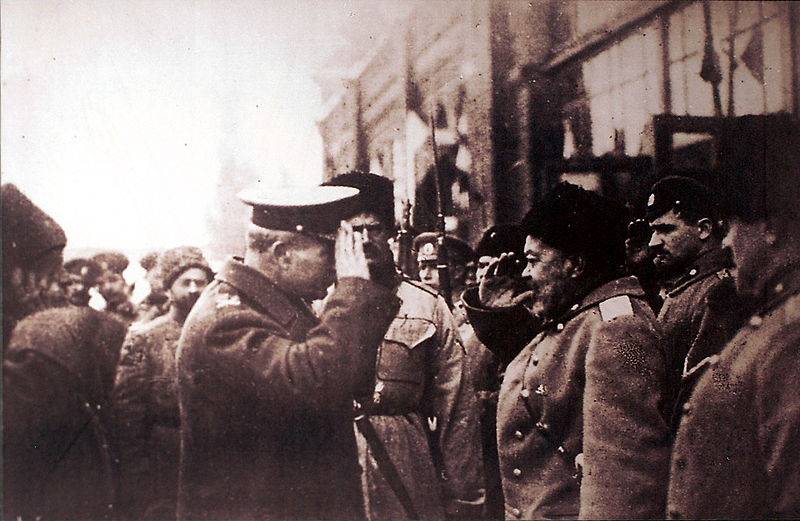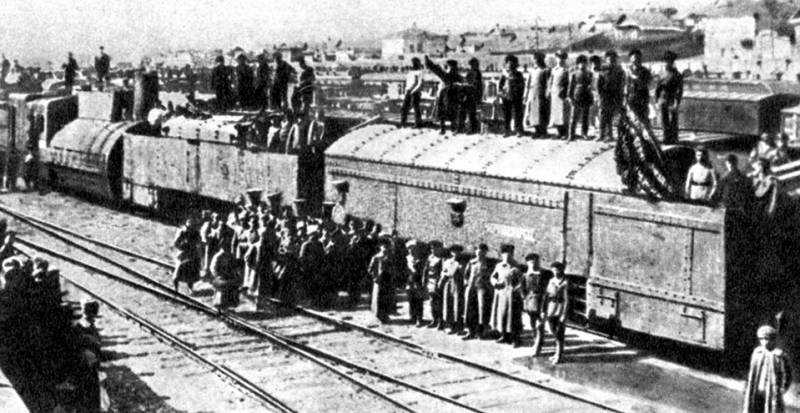How the British created the Armed Forces of the South of Russia
Thus, the Armed Forces in the South of Russia (VSYUR) were created, the commander in chief of which was Lieutenant-General A. I. Denikin. Denikin and the Volunteer Army became the core of the Russian statehood created in the South of Russia (as part of the White Project).
The situation in the south of Russia
The main anti-Bolshevik forces in the South of Russia in 1918 were the armies of Denikin and Krasnov. Volunteers were oriented toward the Entente, and the Krasnov residents were oriented toward Germany, which at that time controlled Little Russia (Ukraine). Krasnov did not want to quarrel with the Germans, as they covered Don from the left flank and supported the Cossacks weapons in exchange for food. Ataman of the Don Cossacks proposed attacking Tsaritsyn in order to unite with the Eastern White Front on the Volga. White command was hostile to the Germans and wanted to establish a single military command in the south of Russia and create a single rear. However, Krasnov did not want to go into submission to Denikin, tried to preserve and even expand the independence of the Don Region. As a result, Denikin, unable to advance in two directions, chose the Kuban and the North Caucasus as the main operational direction. At the same time, allied relations with Don were maintained, and the Don Region was the rear of the Volunteer Army (manpower, finances, equipment, weapons, etc.). Krasnov also focused his efforts on the Tsaritsyn area (two battles for Tsaritsyn: July - August, September - October, 1918 of the year).
By the end of 1918 - the beginning of 1919, the balance of power between the Don Army Krasnov and the Volunteer Army of Denikin changed in favor of the volunteers. The Don army could not take Tsaritsyn, was weakened, drained of blood, the decomposition of Cossack troops, tired of a fruitless war, began. Denikin's army conquers the North Caucasus from the Reds, gets a rear base and a strategic base for further combat operations. But the main thing was that the German Empire suffered a defeat in the world war and the Entente powers got access to the Black Sea region, the Northern Black Sea region, the Crimea. The chieftain Krasnov’s bet on the Germans was a bit. The defeat of the German bloc knocked the ground out from under the feet of the Don Ataman, he lost external support. Don Army now had to follow the left flank, with the evacuation of the Germans, the front line immediately increased by 600 km. Moreover, this huge hole fell on the Donetsk coal basin, where the workers supported the Reds. And from Kharkov, the Petliurists threatened, Makhno's gang from Tavria. The Cossacks did not have the strength to keep the Southern Front. The agreement with Denikin, with the transition under his arm, became inevitable. Since the allies promised to supply the anti-Bolshevik forces (including the Don Cossacks) with ammunition, weapons, equipment and other assistance only if they were united, headed by Denikin. Krasnov was compromised by his connection with the Germans and he had no other way out.
Thus, the defeat of the German bloc radically changed the situation on the Southern Front (also on the Western Front). The representative of Denikin, and then Kolchak, under the Allied Command was General Shcherbachev (former commander of the Romanian Front). In November 1918, the commander-in-chief of the Allied forces in Romania, General Bertello, announced that in order to help the white forces, they plan to move the French and Greek divisions of Thessaloniki to the South of Russia (Thessaloniki Army). However, in reality in London and Paris were not going to fight for the whites.
Krasnov also tried to restructure his policies on the Entente powers. He sent his embassy to Romania. He asked for international recognition of the Great Don Army, as an independent state (until the restoration of a united Russia). He invited the Allied missions to him, spoke about the forcedness of his former pro-German orientation. He proposed a plan for an attack on the Reds in the case of direction to the South of Russia of 3 - 4 corps (90 - 120 thousand people). The allies also promised Krasnov assistance against the Bolsheviks, but refused to recognize his government. The Allies saw only one government and command in the South.
In November 1918, ships of the Entente powers entered the Black Sea. The allies landed the first landing force in Sevastopol, the allies rushed to seize the remaining ships and property of the Russian Black Sea fleet, which before that was controlled by the Germans. The Crimean government of General Sulkevich, focusing on Germany and Turkey (Sulkevich thought to recreate the Crimean Khanate under the protectorate of Turkey and Germany), resigned, giving way to a coalition Crimean government led by Solomon Crimea. The Crimean regional government of S. Crimea consisted of cadets, socialists and Crimean Tatar nationalists. Sulkevich, warned by the Germans about a thorough evacuation, asked Denikin to send troops to defend against anarchy and the Bolsheviks. He himself went to Azerbaijan, where he headed the local General Staff. The White Command sent the cavalry regiment of Gershelman, small detachments of Cossacks and other units to Sevastopol and Kerch. General Borovsky was to begin recruiting volunteers and form a new Crimean-Azov army in order to create a single line of the Southern Front from the lower reaches of the Dnieper to the borders of the Don region.
The Allies also landed troops in Odessa (mostly French, Polish and Greeks) in November-December 1918 of the year. Here they came into conflict with the armed forces of the Directorate of the UPR, but as a result, the Petliurists, fearing war with the Entente, were forced to cede Odessa and the Odessa region. In late January - early February 1919, the Allied forces took control of Kherson and Nikolaev. In the area of the mouth of the Dnieper, the interventionists united with the forces of the White Guard Crimean-Azov Army. The French command took anti-Bolshevik positions, but was not going to support only one force. In the South of Russia, the French decided to support the Ukrainian Directory and the Russian Directory, which was to include a representative of Denikin’s army. Denikin was considered by the French to be a creature of the British, so they were not going to bet only on the Volunteer Army. On the whole, the French did not intend to fight in Russia against the Reds, for this purpose the local "cannon fodder" —the Russian and Ukrainian troops — was meant.

French patrols in Odessa. Winter 1918 - 1919
Entente ships appeared in Novorossiysk. In December 1918, the official military mission led by General Frederick Pull (Poole, Poole) arrived at Denikin. Prior to that, he commanded the interventionist forces in the north of Russia. The White Command hoped that the Allies would provide troops to maintain order in the occupied territory, which would provide them with a solid rear and calm. Foreign troops in the rear will calmly mobilize, deploy a more powerful army and concentrate all white forces to fight the Bolsheviks. With the help of the Entente powers, by May 1919, the white command was supposed to complete the formation of the army and launch a decisive offensive together with Kolchak. Bullets promised help, the landing of the Entente troops was planned, they promised weapons and equipment on the 250-thousand. the army. Foreign officers also went to Don from Sevastopol on an unofficial mission to the Cossacks. Allies generously lavished promises, but their chatter, like statements by officials, were words without real content. The Allies studied the situation, put the most important points and bases under control, plundered. However, London and Paris were in no hurry with the large-scale landing of troops, weapons and equipment were also held.
On the Don front things were getting worse. Part of the 8 Red Army began to move around the Don Army. The Cossacks had to suspend offensive operations in the Tsaritsyn sector. Two divisions were transferred to the left flank, they occupied Lugansk, Debaltseve and Mariupol. But this was very little that cover up a new vast front. The Cossacks were rare outposts, and it was impossible to weaken other areas. Krasnov was forced to ask for help from Denikin. He sent an infantry division May-Mayevsky. In mid-December 1918, she landed in Taganrog and occupied the area from Mariupol to Yuzovka. He couldn’t send more Denikin, at the same time the white detachments occupied the Crimea and North Tavria, and in the North Caucasus the last decisive battles boiled, the Reds tried to go on the counter offensive.
The Allied Command finally pushed the issue of creating a single command of anti-Bolshevik forces in the South of Russia. Negotiations on this began in Yekaterinodar, chaired by General Dragomirov, and were attended by representatives of the Volunteer Army, the Kuban, and Don. They talked about a single government, a single army and a single representation in front of the Entente. The agreement did not come, representatives of the Don refused to obey. British General Poole personally got down to business. 13 (26) December 1918 was held at the Kushchyovka railway station on the border of the Don and Kuban regions. A meeting took place between Bullet and General Dragomirov on the one hand, and Don Ataman Krasnov and General Denisov on the other. The meeting discussed the issue of joint actions of the Volunteer and Don armies, on the subordination of Krasnov to Denikin. Krasnov refused complete subordination of the Don region to Denikin, but agreed with Denikin's high command over the Don army in operational matters. As a result, Pul helped Denikin subjugate the Don Army.
December 26 1918 (January 8 1919) a new meeting was held at Torgovaya station. Here an agreement was signed on the unification of the armies of Denikin and Krasnov. The Don Army (by the end of January 1919 had 76,5 thousand bayonets and sabers) was transferred to operational subordination to Commander-in-Chief Denikin, while internal affairs remained under the jurisdiction of the Don government. Thus, the Armed Forces in the South of Russia (VSYUR) were created, the commander in chief of which was Lieutenant-General A. I. Denikin. The Volunteer and Don armies became the core of the VYVR Now Denikinians have become the basis of the re-created Russian statehood (white project) and the main force of anti-Bolshevik resistance in the South of Russia.
As a result, having lost the external support of Germany, under pressure from the Entente and under the threat of a powerful new offensive of the Red Army on the Don, Krasnov went to the union and subordination to Denikin.
December 28 1918 of the year (January 10 of the year 1919) Poole visited Don, arrived in Novocherkassk. He also, together with Krasnov, visited the front of the Don Army. 6 (19) January 1919, the Bullet left the Don region, going back to Britain. Before leaving, he promised Krasnov that British troops would soon arrive to help the Don Army. The French representatives also promised that their troops from Odessa would go to Kharkov. However, London and Paris were not going to send their troops to war with the Reds. The bullet that gave too many promises was replaced by General Charles Briggs.

Commander-in-Chief of the Armed Forces of the South of Russia A. I. Denikin and the English General F. Pul
The third defense of Tsaritsyn
Krasnov in January 1919 of the year organized the third offensive against Tsaritsyn. However, it failed. By mid-January, the Don Cossacks, breaking the stubborn resistance of the 10 Army under the command of Yegorov, again seized the city with a half-ring. On January 12, the White Cossacks struck north of Tsaritsyn and captured Dubovka. In order to repel the enemy strike, the Red Command removed the Combined Cavalry Division of BM Dumenko (the core of Budenny’s future cavalry army) from the southern sector and transferred it to the North. Taking advantage of the weakening of the southern section, the Donets on January 16 captured Sarepta, but this was their last victory. On January 14, the fighters of Dumenko drove the Krasnovites from Dubovka, and then under the command of Budyonny (Dumenko was sick) made a deep raid on the enemy’s rear. The 8-i and 9-i Reds launched an offensive began to threaten the Don army from the rear. As a result, in mid-February, the Cossacks retreated from Tsaritsyn. 15 February 1919, Krasnov was forced to resign, the next day, General A. Bogaevsky was elected troop chieftain. Now the Don Region was completely subordinated to Denikin.
Armored train "Turtle", which operated near Tsaritsyn in 1918 year. Photo source: https://ru.wikipedia.org

Information